 |
 |
 |
| |
Comorbidity Rate Does Not Affect F/TAF Persistence Through 24 Months
|
| |
| |
HIV Drug Therapy/Glasgow 2020, October 5-8, 2020
Mark Mascolini
Having 0, 1, or 2 or more comorbidities when starting an emtricitabine/tenofovir alafenamide (F/TAF)-based regimen did not greatly affect persistence (continued use) of that regimen through 24 months in a 714-person German cohort [1]. Virologic response rates did tend to dim more over time in people who started treatment with more comorbidities.
As people live longer with HIV infection, per-person comorbidity rates are on the rise. Researchers working with the German TAFNES cohort asked whether number of comorbidities when starting an F/TAF-containing combination affects treatment persistence or virologic response through 24 months of follow-up.
TAFNES aims to provide real-world data on people starting an F/TAF-based regimen in clinical practice, either single-tablet elvitegravir/cobicistat/F/TAF (E/C/F/TAF), single-tablet rilpivirine (R)/F/TAF, or a multitablet combination containing F/TAF and a third drug. Virologic effectiveness meant a viral load below 50 copies at 24 months, with discontinuation meaning failure and loss to follow-up or missing data excluded. Regimen persistence meant continuing to take study drugs, that is, no discontinuation (not counting loss to follow-up).
Of the 714 F/TAF-treated people analyzed, 92% were men, median age stood at 45 (interquartile range [IQR] 34 to 54), and median CD4 count at 556 (IQR 390 to 765). Most people, 61%, were antiretroviral-experienced when starting their F/TAF-containing regimen. While 308 people (43%) started with E/C/F/TAF, 179 (25%) started with R/F/TAF, and 227 (32%) with a different third agent.
Overall, 356 people (50%) had 1 or more documented comorbidity, including 115 taking E/C/F/TAF (37% of that group), 99 taking R/F/TAF (55% of that group), and 142 taking a third agent with F/TAF (63% of that group). The most frequent comorbidities were hypertension (in 15%), neuropsychiatric disorders (in 11%), hyperlipidemia (in 6%), and cardiovascular disease (in 5%).
Of the 714 cohort members, 198 (28%) stopped their F/TAF regimen and/or stopped the study before month 24. The main reasons for stopping F/TAF were to simplify treatment (4.2% of 714) and to avoid adverse reactions (3.6%), followed by patient wish, investigator discretion, drug-drug interaction, virologic failure, death, and other or "no reason specified." In 24 months, 41 cohort members (5.7%) had 51 adverse drug reactions, including 3 serious adverse drug reactions. Only 1.3% of the group discontinued because of virologic failure.
At 24 months the researchers recorded virologic effectiveness (defined above) in 75% of participants. Effectiveness proved more frequent in people with no comorbidities (79%) than in those with 1 comorbidity (73%), or 2 or more comorbidities (69%). Effectiveness rates varied slightly from one comorbidity to another, for example, 74% with hypertension, 73% with hyperlipidemia, 69% with neuropsychiatric disorder, and 64% with cardiovascular disease.
Overall study and study-drug persistence stood at 81% after 24 months. Persistence proved more frequent in people with no comorbidities (85%) than in those with 1 comorbidity (78%) or 2 or more comorbidities (76%). The 24-month persistence rate was lower in people with hyperlipidemia than without hyperlipidemia (77% vs 81%), but higher in people with cardiovascular disease than without cardiovascular disease (89% vs 81%). Persistence was less frequent in people with neuropsychiatric disorder than in those without a neuropsychiatric problem (78% vs 81%).
But the researchers observed that persistence rates virtually overlapped in people with 0, 1, or 2 or more comorbidities through the first 12 months of the study. They attributed the slight divergence between 12 and 24 months to reasons other than virologic failure or adverse drug reactions, as listed 3 paragraphs above. Thus they concluded that pretreatment comorbidity number does not affect persistence of F/TAF regimens.
Reference
1. Scholten S, Hillenbrand H, Postel N, et al. Impact of baseline comorbidities on ART persistence and effectiveness in PLWH receiving F/TAF-based regimens: final 24-month results from the German TAFNES cohort study. HIV Drug Therapy/Glasgow 2020, October 5-8, 2020. Abstract P063.
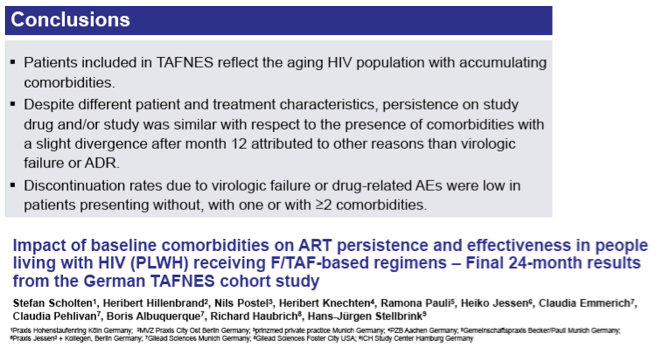
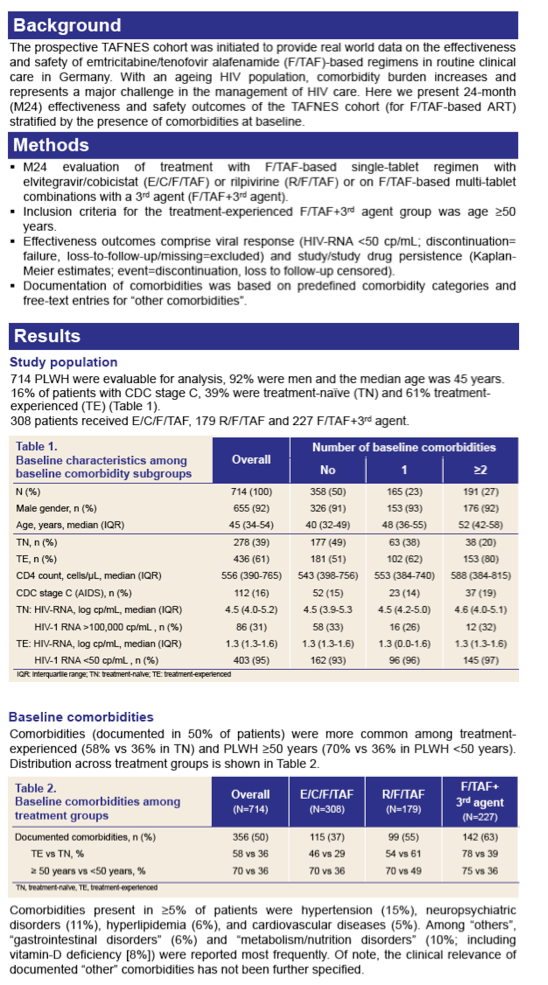
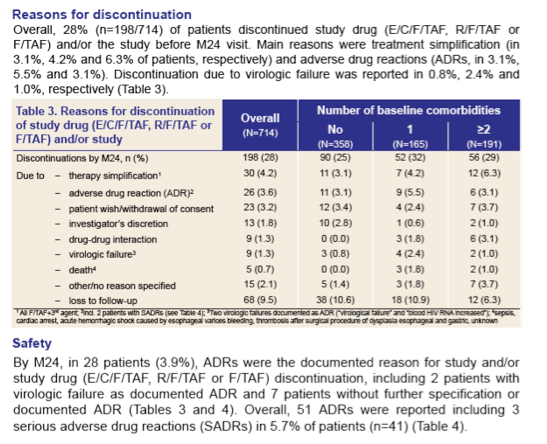
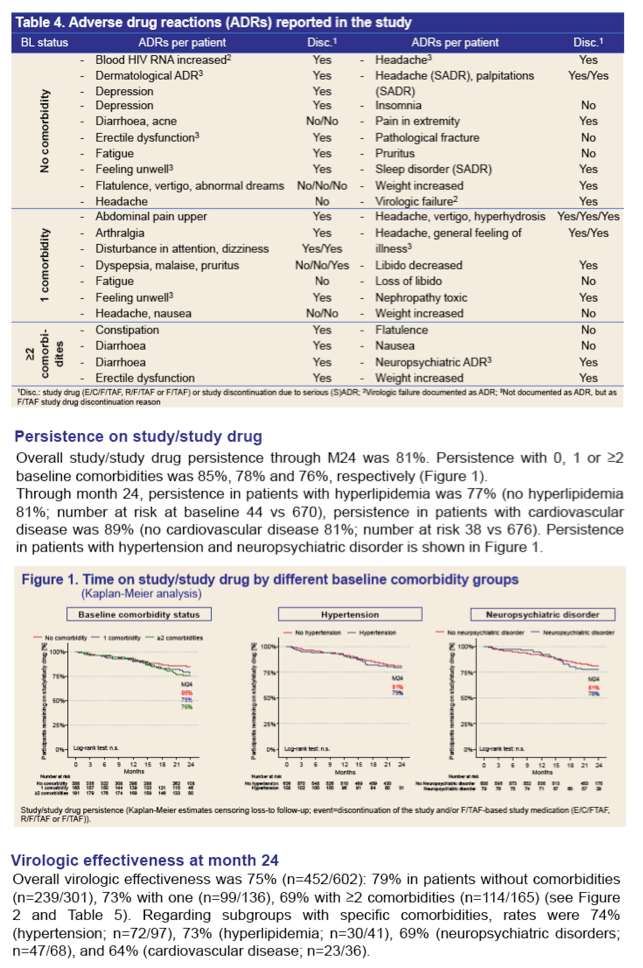
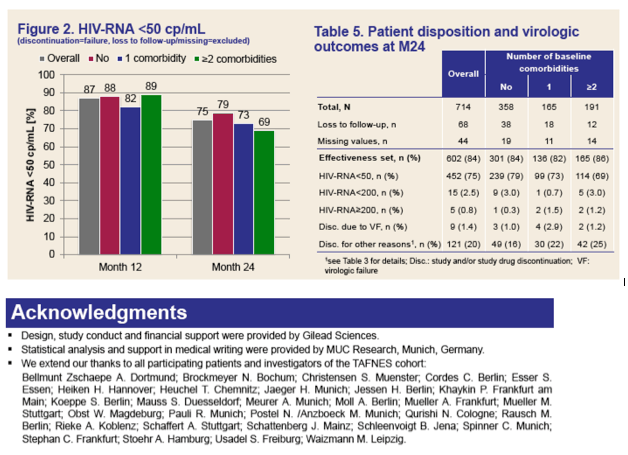
|
| |
|
 |
 |
|
|